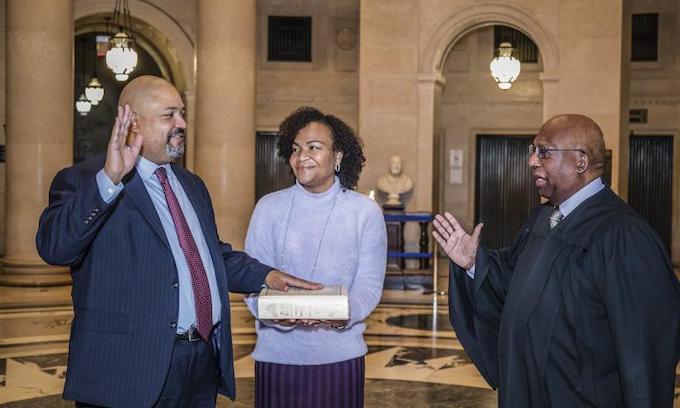In a time of rising mayhem on city streets, Manhattan’s new district attorney wants to dial back prosecution of minor crimes.
Alvin Bragg, a former federal prosecutor sworn to office Jan. 1 as Manhattan’s first Black DA, told his staff not to bother with many cases of fare beating, resisting arrest and other nonviolent crimes — a move toward fulfilling his campaign promise of criminal justice reform.
“These policy changes not only will, in and of themselves, make us safer; they also will free up prosecutorial resources to focus on violent crime,” Bragg wrote in a memo dated Tuesday.
He promised that new initiatives and policies on guns, sex crimes, hate crimes, and other issues will be announced in the coming weeks
Law enforcement unions were skeptical, and feared the new policies would reduce cops’ legal tools to fight crime.
“He’s emboldening the criminal element to resist arrest and put New York City police officers and detectives in harm’s way,” said Paul DiGiacomo, head of the NYPD Detectives’ Endowment Association.
Patrick Lynch, the president of the Police Benevolent Association, said although he had “serious concerns” about Bragg’s proposals, he was willing to talk them through with the new DA.
“Police officers don’t want to be sent out to enforce laws that the district attorneys won’t prosecute. And there are already too many people who believe that they can commit crimes, resist arrest, interfere with police officers and face zero consequences,” he said in a statement.
Mayor Adams, a former NYPD officer, seemed willing to give Bragg the benefit of the doubt, for now.
“I have a lot of respect for DA Bragg … He has a real vision,” Adams said at a press conference when asked about the new policies. “We’re all going to come together and wear one jersey: Team Safe New York.”
Bragg’s memo gives his assistants many specific instructions on how to handle parts of New York’s penal code — but he also cautioned that they’re not set in stone.
“My commitment to making incarceration a matter of last resort is immutable,” he wrote — before adding: “The path to get there through these policies will be dynamic, and, not static.”
He said he’d be speaking with his staff about the changes in the coming weeks.
Bragg’s instructions to his assistants come with plenty of caveats.
Resisting arrest can only be charged if the person is resisting arrest for a serious crime — and the charge of obstructing governmental administration can only be charged against people who are aiding someone who is resisting arrest.
Bragg asked his staff not to pursue certain misdemeanor cases of trespassing — so long as they don’t involve stalking or crimes covered by laws meant to bar abuse by family members against each other.
Burglary can only be prosecuted as having happened in someone’s home if suspects enter a place with direct access to a building’s residential space, the memo says.
That means people who burglarize apartment building basements, or basements of commercial buildings with apartments on upper floors, would face burglary charges carrying lesser punishments.
Bragg said that in prostitution cases, assistant district attorneys can still charge sex traffickers and pimps. And any of the misdemeanor charges on Bragg’s list can be prosecuted if they are part of an indictment that includes a felony charge.
Aggravated unlicensed operation of a motor vehicle can only be charged if a motorist is also accused of involvement in dangerous driving or crashes that injure someone, Bragg’s memo says. It can’t be used against people whose only offense is failing to pay fines.
Bragg said his policies will improve public safety and curb crime. “Data, and my personal experiences, show that reserving incarceration for matters involving significant harm will make us safer,” he wrote.
Bragg’s new policies take further many practices of his predecessor, Cy Vance.
Vance in 2018 stopped prosecuting most fare beating cases. Also that year, Vance ordered a halt to prosecution of marijuana possession cases, except for those involving sales or cases that posed some public danger. He and other DAs around the city also sought dismissal of thousands of pot possession charges.
Vance stopped prosecuting prostitution cases in 2016, and along with other city DAs sought dismissal of thousands of charges of loitering for the purpose of prostitution and providing massages without a license. Bragg’s memo appears to continue that policy.
In his memo, Bragg advised assistant DAs that people who miss court dates won’t automatically be assumed to be fleeing law enforcement, resulting in bench warrants. And prosecutors will consider undocumented people’s immigration status before filing charges. The office is also scaling up support for New Yorkers coming out of the system post-conviction.
Bragg, a Harlem native, explained his desire for the new rules by citing personal experience and proximity to violence.
“Before I was 21 years old, I had a gun pointed at me six times: three by police officers and three by people who were not police officers. I had a knife to my neck, a semi-automatic gun to my head, and a homicide victim on my doorstep,” he wrote of his life growing up in New York City in the 1980s.
“In my adult life, I have posted bail for family, answered the knock of the warrant squad on my door in the early morning, and watched the challenges of a loved one who was living with me after returning from incarceration.”
Jullian Harris-Calvin of the Vera Institute of Justice lauded the moves by Bragg, who she said was poised to be a very different DA than his predecessor, Cyrus Vance Jr.
“Manhattan sends more New Yorkers to Rikers Island than any other borough, and DA Bragg’s directive hits directly at the heart of the problem,” said Harris-Calvin.
Bragg said keeping defendants out of jail before their case goes to trial will now become standard practice except for homicides and violent assaults including sex offenses, domestic violence cases, and cases involving “public corruption, rackets, or major economic crimes.”
The new DA cites the crisis on Rikers Island, where 16 prisoners died in 2021 awaiting trial, among reasons for reserving pretrial detention only for severe cases.
Bragg also set out a new policy on sentencing requests, saying that the office would request a maximum of 20 years in prison for all crimes that do not have a life-in-prison option. He also noted the office would never seek life without parole in any case.
And the new administration will strive to limit the number of young people tried as adults, which Bragg said evidence shows will lower recidivism rates and make communities safer.
A source at the DA’s office said the new framework intends to keep people safe from violent crime while challenging the notion that incarceration equals safety through data-backed approaches.
“The present system, that recycles people in and out for 30 days — or three months — and they come out worse, has been ineffective,” the source said.
©2022 New York Daily News. Visit nydailynews.com. Distributed by Tribune Content Agency, LLC.
—-
This content is published through a licensing agreement with Acquire Media using its NewsEdge technology.



















Apparently he has not been taught the when people get away with petty stuff they usually advance to bigger stuff until they reach their full potential. And that is why the prisons are full. Neither race nor schooling has anything to do with it it is their upbringing. Most of them are not introduced to Jesus Christ until they are locked up.
IT makes you wonder, HOW IN GODS NAME< can cretins like him, who FLAT OUT SPOUT "I WILL NOT ENFORCE THE LAW", can even RUN for office AS A DA, since they are flat out TELLING EVERYONE< "I will not do the job you are voting me into office for"!????
I gather, in this case, DA stands for Dumba**.
Hah! Ha ha ha ha ha haaaa..
You made my night!
WHEN it comes to these demon=spawn SOROS FUNDED DA’s it certainly seems to mean that!
“Manhattan’s first Black DA, told his staff not to bother with many cases of fare beating, resisting arrest and other nonviolent crimes — a move toward fulfilling his campaign promise of criminal justice reform.”
Oh No, there are an unproportionate amount of people in color in prison!
“Black people make up 23 percent of New York’s population, but they commit 75 percent of all shootings. … Whites are 33 percent of the city’s population, but they commit fewer than 2 percent of all shootings…
“These disparities mean that virtually every time that police in New York are called out after a shooting, they are being summoned into minority neighborhoods looking for minority suspects.”
I.A.W. U.S. Census & FBI (Table 43a)
Black males make up about 6% of the U.S. population but commit ~54% of all the murders and ~57% of all robberies in the U.S..
One does not have to be very bright is see why there are more people of color in prison than White people.
BUT:
To Democrats, Truth, Facts, Reality and History are all irrelevant,
If the Democrats do not WANT to believe them or they disagree with them.
Democrats will just make up their own, Truth, Facts, Reality, History or voter tally to fit what they WANT to believe or fits into the Con or Deception that they are running at the time.
As if new york city wasn’t enough of an open sewer already. I live in the mid west, and I’m still to close to new york city.
More and more, i keep wanting one of those films where aliens showed up and BLEW UP NYC, to appear for real, and go to town!!!
What’s the problem? I mean. it’s just a petty crime, nothing big, who is it hurting…
EXCEPT the people they’re hurting?
Get a grip and grab a hold of the express train to reality you stupid, unconscious believers in anything but what is logical and the way serious people of moral character have been fighting for since…EVER?
Just like the teachers, if you don’t want to do the job, whether you’re overwhelmed, confused, have before it occurs PTSD, or are just a low-life lazy slob who lucked into a Government job by ways you”re uncomfortable to share, if you are uncomfortable or otherwise unable to do the job you have: QUIT!
I’m sure you have a bright future writing code with all those unemployed coal miners.
Mayor Adams, a former NYPD officer, seemed willing to give Bragg the benefit of the doubt, for now.
Seems to me that the New Mayor Adams may have been one of those DO NOTHING Police . Just makes me wonder how many arrests he has made in his career and how many times he has testified in court.
I WARNED folks, when adams was running, HE MAY SPEAK THE SPEAK, but when it comes to action, HE WILL BE LIKE ALL commucrats.. SILENT!
It is hard to fathom the depths of ignorance and illogical thought that the infected liberal mind can achieve. Even with enormous, unquestionable mountains of evidence and results showing the massive increases in all crimes in cities that go this route are hit with – they continue to fuel the fire that will burn their town down. Any educated person knows that letting criminals off of lesser offenses only escalates them to more serious ones pretty much 99% of the time. And yet there are people even more stupid who voted this humanoid in. Our suburban towns and counties infected with dem leadership have no hope and a certain future of crime, destruction and death. And these maniac leaders have a special reserved seat in Hell – up close to the flames. May they be seated soon.
As soon as one of Alvin Bragg’s own family or friends is the victim of a “nonviolent crime,” I feel confident that he will want to throw the book at the criminal. The only victims that he won’t care about are the unpowerful little people.
WITH as heartless as many of these commucrats are, some i fear, EVEN IF IT IS THEIR OWN KIN that are victimized by crooks, STILL WON’T CARE.
So it’s back to the good (or is that bad?) old days of the 1980s in NYC! Mugging, turnstile jumping, urinating in public, car break-ins – all with no consequences. You New Yorkers voted for this, now you’re gonna get it hard! Enjoy.
AND when you wise up and FLEE NY.. Don’t bring your insane libtard ideas with ya!